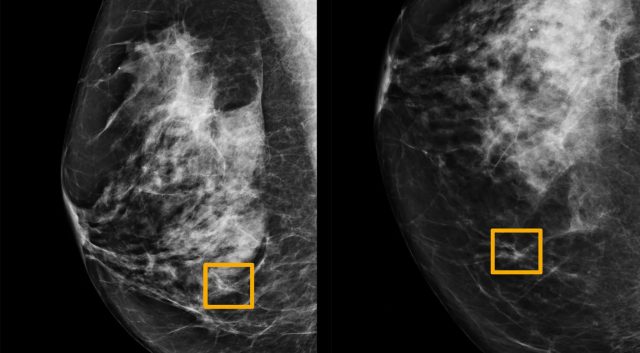 Google AI model could reduce miscalculation and misdetection on breast cancer. (Image via ExtremeTech)
Google AI model could reduce miscalculation and misdetection on breast cancer. (Image via ExtremeTech)
Google's AI shows potential for detecting breast cancer
Artificial Intelligence (AI) by Google has improved so much that it could prevent miscalculation or misdetection of breast cancer. It does a better job than doctors and mammograms. A joint study on Google’s AI was conducted in the United States (U.S) and the United Kingdom (U.K).Researchers from DeepMind (company owned by Alphabet/Google), Cancer Research UK Imperial Centre, Northwestern University, and Royal Surrey Country Hospital pointed out that the Google AI model had greater accuracy and less miscalculation and misdetection compared to those of mammograms and experts.
For the study, the researchers trained the AI system on de-identified mammograms from over 76,000 women in the UK and 15,000 women in the US.
The AI was able to reduce the false negatives shown by mammograms by 5.7 percent in the U.S and 1.2 percent in the U.K. Later on, the AI model also reduced false negatives by 9.4 percent in the U.S and 2.7 percent in the U.K.
Then, the AI model was evaluated on a different set of de-identified data that came from 25,000 women in the UK and over 3,000 women in the US.
The double false negatives study was conducted because, in the U.K, two doctors are required to read the mammogram. Therefore, the U.K results were compared to the initial mammogram reader.
Meanwhile, in the U.S, the reading is performed by one radiologist every other year. Therefore, the U.S results were compared to the Breast Imaging Report and Data System (BI-RAD) score.
Not only the reading but also the collaboration study conducted an independent "comparison with a reader study" of six US-board certified radiologists. The result was that the AI model outwitted these radiologists by far margin.
Breast cancer is one of the most frequent terminal illnesses suffered by women, one of eight American women suffers from breast cancer in her lifetime. according to the National Breast Cancer Foundation. Therefore, early detection and treatment are required to preserve life.
Nonetheless, both the U.S and the U.K are short in trained radiologists currently; therefore, more sophisticated and accurate tools are on high demand. But, the uncertainty remains high as they want these tools to be tested in the near future.
Google, on the other hand, has been developing its AI for medical scenarios. In the past few years, Google joined arms with other medical firms to develop its AI for the detection of diabetic retinopathy, heart conditions and more. So, it is not impossible that one day, AI will be the frontline of the early detection of cancers.
However, in the end, the study said that more clinical trials were required to determine the usage of AI in medical practice.
Source: https://bit.ly/2SOUm74
 English
English Japan
Japan

drugs to avoid with viagra cenforce 100 customer reviews cheap viagra simvastatin and cialis protein pills for women how does female viagra work man jokes for women strongest viagra pill homemade viagra ingredients walgreens generic viagra price over the counter erectile pills at walgreens viagra government funded when is generic cialis available dr oz recommends rock hard natural viagra recipe mixing alcohol and cocaine best herbs for libido men viagra effects video viagra pfizer what is sildenafil tablets does walgreens minute clinic accept medicaid viagra side effects for men viagra jokes how to take cialis 20mg how much does sildenafil cost levitra vs viagra health benefits of pineapple viagra fedex overnight shipping best natural substitute for viagra what does viagra do $4 generic list kroger
150 mg sildenafil sildenafil 100mg tablets for sale fildena 100 mg softgel viagra use aarp pill identifier pill identification fda approved diet plans viagra cost per pill walmart
when women take viagra cvs 25% off entire purchase generic tadalafil india viagra men sandy from grease makeup family dollar coupon policy
cialis vs viagra which is better cialis cost 5mg printable prescription labels joke natural viagra recipe 24 hour cialis viagra coupons for walgreens